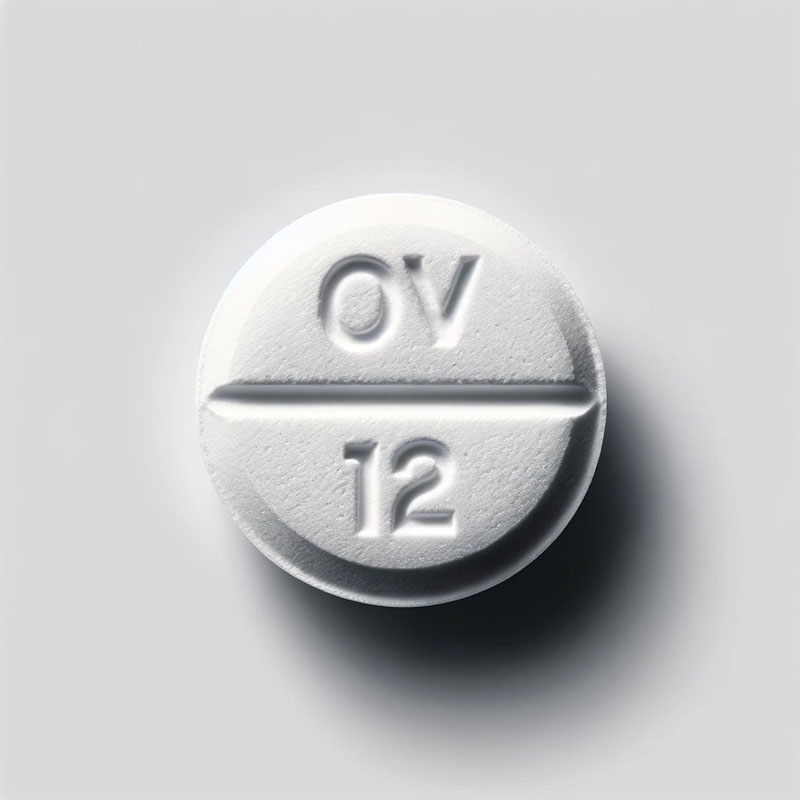Prescription Drugs | 5 min read
What is Desoxyn®? The Ultimate Guide
Medically Reviewed By

On November 20, 2023
Written By
On November 20, 2023

What you will learn
- Desoxyn® is a central nervous system stimulant and is used as a treatment for severe Attention-Deficit Hyperactivity Disorder (ADHD) and obesity.
- The stimulant is classified as a Schedule II controlled substance by the DEA.
- Desoxyn® has a high risk of abuse and addiction, a potential for severe physical and psychological side effects, and serious drug interactions.
- Overdosing on Desoxyn® can cause serious and potentially life-threatening side effects, including heart attack, stroke, high blood pressure, irregular heartbeat, seizures, and even death.
- Medically detoxing from this substance is the safest path to begin your recovery and reduce the severity of withdrawal symptoms.
What Is Desoxyn® and What is it Used For?
Desoxyn® (pronounced dess-ocks-in) is a brand name for the prescription drug methamphetamine hydrochloride. Desoxyn® is a central nervous system stimulant and is used as a treatment for severe Attention-Deficit Hyperactivity Disorder (ADHD) and obesity.
Off-label uses for Desoxyn® include the treatment of narcolepsy and depression, however, these uses have not been approved by the FDA, and Desoxyn® is not recommended for long-term use. Current clinical guidelines should be consulted for these indications.
How Desoxyn® Works
Desoxyn® works by increasing the release of neurotransmitters, such as dopamine and norepinephrine, in the brain.[1] This increase in neurotransmitter activity leads to improved attention, focus, and decreased appetite.
Desoxyn® Pros vs. Cons
Desoxyn® (methamphetamine hydrochloride) has potential benefits for individuals with attention-deficit/hyperactivity disorder (ADHD) and obesity, but it also has several negative side effects and a high potential for abuse and addiction.
Some of the pros of Desoxyn® include:
- Improves focus, attention, and decrease impulsivity in people with ADHD
- Appetite reduction and promoting weight loss for those with clinical obesity.
The cons of Desoxyn® include:
- High risk of abuse and addiction,
- Potential for severe physical and psychological side effects such as heart problems, increased anxiety, and paranoia.
- Potential for serious drug interactions
Deosxyn is classified as a Schedule II controlled substance by the U.S. Drug Enforcement Administration (DEA), and is typically only used as a last resort and under close medical supervision.[2]
How Long Does Desoxyn® Take to Work?
Desoxyn® is usually taken orally, and its effects can typically be felt within 30 to 60 minutes of consumption but can vary depending on factors such as metabolism, tolerance, and the dose taken.
How Long Do The Effects of Desoxyn® Last?
The effects of Desoxyn® can last for several hours, with the peak effects occurring about 2 to 3 hours after taking the drug.
What Does Desoxyn® Look Like?
Desoxyn® comes in pill form, but the pills may differ in terms of imprint, depending on the manufacturer. Most commonly, Desoxyn® comes in the following forms:
Supplier/Labeler |
Description |
Dosage |
Imprint |
| Labeler / Supplier
Ovation Pharmaceuticals Inc |
White, round tablet | 5mg | a |
| Abbott Laboratories | White, round tablet | 5mg | A, TE |
| Lundbeck Inc. | White, round tablet | 5mg | OV, 12 |
| Recordati Rare Diseases, Inc | White, round tablet | 5mg | R, 12 |
Desoxyn® Dosages
The recommended dose for ADHD is 5-30 mg per day, in divided doses, with the larger dose being taken in the morning. For obesity, the recommended dose is 5-15 mg taken orally two to three times daily, before meals.
The specific dose and duration of treatment with Desoxyn® will vary based on individual factors such as the patient’s medical history, age, and response to the medication.
Desoxyn® Side Effects
Desoxyn®, like any drug, can produce serious side effects, especially if taken in higher doses or for extended periods of time. Common side effects of Desoxyn® can include:[3]
- Changes in mood and behavior (nervousness, agitation)
- Changes in sleep patterns (trouble sleeping, restlessness)
- Loss of appetite and weight loss
- Nausea and vomiting
- Increased heart rate and blood pressure
- Dizziness and headache
- Chest pain or palpitations
- Increased sweating
- Decreased sexual function
If your doctor has prescribed you Desoxyn® and you are experiencing side effects that do not change or become more intense, it is important to seek medical help right away.
What are the Long-Term Effects of Taking Desoxyn®?
Prior to taking a medication, it is important to be aware of potential health risks. Taking Desoxyn® long-term can result in serious health concerns, including:
- Addiction and dependence
- Cardiovascular issues, such as heart attacks, circulation problems, fast heartbeat, and strokes
- Mental health issues, including anxiety, paranoia, and hallucinations
- Changes in brain structure and function
- Tooth decay, dry mouth, and gum disease
- Skin sores and infections
- Sudden death
If you are taking Desoxyn® and are experiencing life threatening side effects, contact emergency services right away.
Can You Overdose on Desoxyn®?
Yes, it is possible to overdose on Desoxyn®. Overdosing on Desoxyn® can cause serious and potentially life-threatening side effects, including heart attack, stroke, high blood pressure, irregular heartbeat, seizures, and even death.
If you think you or someone you know may have overdosed on Desoxyn®, it is important to seek medical attention immediately.
What Happens if You Get Addicted to Desoxyn®?
Desoxyn® is a high-risk drug, meaning that there is a high potential for abuse and dependency.
Signs and symptoms of a Desoxyn® addiction include:
- Changes in behavior or attitude
- Damage to the teeth and gums
- Continued use despite negative consequences
- Difficulty controlling usage
- Increased tolerance
- Malnutrition
- Skin sores
- Neglect of responsibilities or personal relationships
- Persistent desire or unsuccessful efforts to quit
- Spending a lot of time obtaining, using, or recovering from use of Desoxyn®
- Using Desoxyn® in larger amounts or for a longer period than intended
Those suffering from a Desoxyn® addiction may experience signs of withdrawal when attempting to quit. Some of the most common Desoxyn® withdrawal symptoms include;
- Cravings for the drug
- Depression
- Fatigue
- Irritability
- Anxiety
- Insomnia
- Nightmares
- Nausea
- Vomiting
- Diarrhea
If you or a loved one are experiencing signs of symptoms of a Desoxyn® addiction, it is important that you seek help as soon as possible to prevent further damage to physical and mental health.
How Do You Detox From Desoxyn®?
Detoxing from Desoxyn® on your own can lead to fatal consequences and must be done under medical supervision. If your doctor has prescribed you Desoxyn®, it is important that you seek medical direction before stopping the medication.
If you’ve become addicted to your Desoxyn® prescription, or you are taking Desoxyn® that you obtained off the street, more complex measures may need to be taken, such as admission to a detox center and subsequent substance abuse treatment.
Medically detoxing from Desoxyn® is the preferred method of detox, as detoxing under a healthcare professional can ensure safety and comfort and reduce the severity of possible withdrawal symptoms.
What Are the Treatment Options Available for Desoxyn® Addiction?
A Desoxyn® addiction can quickly overshadow everything in your life. But it doesn’t have to be this way.
There are several treatment options available for a Desoxyn® addiction, including medical detox, inpatient programs (IP), Intensive Outpatient Programs (IOP), and Outpatient Programs (OP).
An aftercare program is equally important when undergoing treatment for a Desoxyn® addiction.
Adderall® vs. Desoxyn® vs. Vyvanse®
Adderall®, Vyvanse®, and Desoxyn® are all medications that may be prescribed for the treatment of ADHD and other conditions but have key differentiators.
Below is a chart detailing the similarities and differences of the three drugs.
Specifications |
Adderall®/Adderall® XR |
Vyvanse |
Desoxyn® |
| Generic Name | Amphetamine and dextroamphetamine. | Lisdexamfetamine dimesylate | Methamphetamine Hydrochloride |
| Class | Stimulant | CNS Stimulant | Stimulant |
| Uses | ADHD, Narcolepsy | ADHD/Binge Eating Disorder | ADHD, Obesity |
| Type/Form | Tablet (pill) | Capsules, chewable | Tablet (pill) |
| Active Ingredients | Amphetamine and Dextroamphetamine | Lisdexamfetamine dimesylate | Methamphetamine Hydrochloride |
| Side Effects | Loss of appetite, weight loss, nausea, vomiting, stomach pain, headache, dizziness, nervousness, and increased heart rate. | Nausea, headache, decreased appetite, stomach pain, anxiety, insomnia, irritability, and dizziness | Loss of appetite, weight loss, nausea, vomiting, stomach pain, headache, dizziness, nervousness, and increased heart rate. |
| Onset of Action | Approx. 1 hour | Approx 1-2 hours | Approx 20 minutes |
| Duration of Action | Approx 13 hours | Approx 14 hours | Approx 4-6 hours |
| Abuse Potential | Moderate | Low | High |
| Availability | By prescription only | By prescription only | By prescription only |
Information curated from www.nlm.nih.gov.[4]
Live a Life Beyond Desoxyn® Addiction
No matter who you are, no matter your background, history, or circumstances, you deserve a life that is whole, fulfilling, and substance-free. Desoxyn® addiction can take over your life. We’re here to help you take it back.
If you or a loved one are struggling with an addiction to Desoxyn® or other drugs or alcohol, treatment helps, and help begins here at Ascendant NY. Call and speak with a member of our team today to learn more about our lifesaving Desoxyn® addiction treatment programs.
Frequently Asked Questions About Desoxyn®
Yes, Desoxyn® is a brand name for methamphetamine, which is a powerful and highly addictive stimulant drug. However, it is important to note that methamphetamine is also produced illegally in makeshift laboratories, often referred to as “meth labs.” Meth labs are not regulated, and taking “street” methamphetamine is extremely dangerous and can have fatal consequences.
At Ascendant NY, we understand the complexities of dealing with an addiction, whether you have developed an addiction as a result of a prescription or you have a previous history of drug abuse.
Stimulant medication addiction can be hard to overcome. That’s why we offer high-touch, comprehensive programs to help you heal.
We offer both inpatient care and Intensive Outpatient Programs to help busy, working adults accelerate the path to healing.
Our programs combine gold-standard psychotherapies with holistic healing methods such as acupressure, yoga, barre, Reiki, mindfulness, and meditation. This whole-person approach ensures that you are equipped with the coping strategies you need to prevent relapse and maintain lifelong recovery.
Our treatment facility is located in Midtown, NYC, making Ascendant both conveniently located and a desirable location for those who are looking for a “fresh start” in a new city.
Ascendant New York Editorial Guidelines
Here at Ascendant New York, we understand the importance of having access to accurate medical information you can trust, especially when you or a loved one is suffering from addiction. Find out more on our policy.
[1] Sean Moshrefi, PharmD, Michelle Nguyen, PharmD
Methamphetamine (Desoxyn): Uses, Side Effects, Dosage & Reviews. GoodRx. Accessed May 14, 2023. https://www.goodrx.com/methamphetamine/what-is
[2] Yasaei R, Saadabadi A. Methamphetamine. In: StatPearls. StatPearls Publishing; 2023. Accessed May 14, 2023. http://www.ncbi.nlm.nih.gov/books/NBK535356/
[3] Multum C. Desoxyn Uses, Side Effects & Warnings. Drugs.com. Accessed May 14, 2023. https://www.drugs.com/mtm/desoxyn.html
[4] National Library of Medicine – National Institutes of Health. Accessed May 14, 2023. https://www.nlm.nih.gov/




